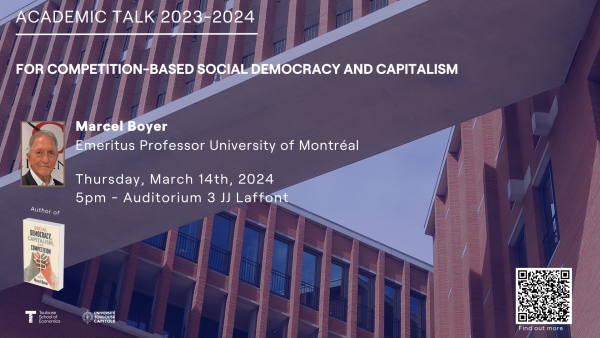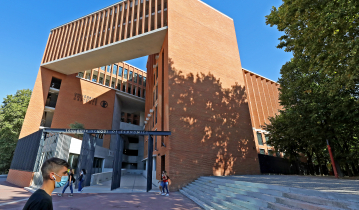TSE careers is glad to welcome Marc Boyer Emeritus professor (University of Montréal) and Associate Professor at TSE-IAST who will present to students an Academic Talk on "For Competition-based Social Democracy and Capitalism" on Thursday 14 March 2024 at 5:00 PM. (Auditorium 3)
This initiative aims to develop the economic culture of our students and help them built their future career plans. Event for TSE Students only.
Contact : careers@tse-fr.eu
ACADEMIC TALK THURSDAY 14 MARCH 2024 - 5PM- AUDITORIUM 3

Abstract:
There is a fundamental complementarity between social democracy and competition. A true social democracy is based on a clear definition of the respective roles of the public (governmental) and competitive (private) sectors in the provision of public and social goods and services (PSGS), such as education, health care, social security, and infrastructure. The main roles of the public or government sector are to define the basket of PSGS in quantity and quality and to manage performance incentive contracts with the (competitive) private sector responsible for producing and distributing these PSGS. Companies (capitalist, cooperative, NFP, social economy, etc.) then compete to obtain PSGS supply contracts and the public sector no longer needs to directly manage schools, hospitals and numerous other institutions serving the citizens.
Other proposed reforms include: the abolition or auctioning of subsidies and aid programs for businesses; the strengthening of pro-competition control of anti-competitive practices as well as business mergers and acquisitions; the determination of a significant and universal carbon price to encourage individuals and companies to internalize the environmental impacts of their strategies; the development of extended liability rules aimed at increasing the incentives of companies and their partners to prevent industrial and environmental accidents and to protect collateral victims; the elimination of taxes on corporate profits in order to thwart tax competition between states and to encourage companies to focus on their essential missions of wealth creation and investment in R&D and productivity. In fine, the proposed models of social democracy and capitalism arise from a conception of social sciences and economics in particular as the study of mechanisms of coordination, motivation, specialization, regulation and rules of exchange that conditions the development of collective intelligence, through the interconnexion of brains, in human society, of which the ability to exchange, particularly with strangers and across time, is a distinctive characteristic.



